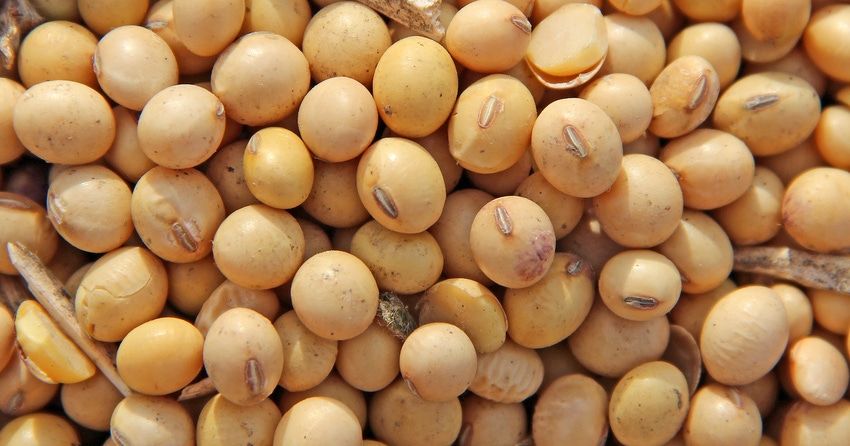
Researchers from seven universities are working together to identify management options to improve soybean quality, especially soy protein levels. Ignacio Ciampitti, a professor in farming systems with K-State Research and Extension is leading the project, funded by the United Soybean Board, with the goal of exploring ways to improve the quality of soybean seeds so that the crop continues to maintain high levels of protein as crop yields increase.
“As agronomists, we are always trying to improve yields, but at the same time we want to preserve the quality of that seed because that is what the end user is buying,” Ciampitti said.
Larry Purcell, Distinguished Professor and Altheimer Chair for Soybean Research with the University of Arkansas System Division of Agriculture serves on the project representing the Delta region.
“The protein concentration in soybean has steadily declined over the past 25 years,” Purcell said. “We want to better understand why the protein levels are decreasing, and if there are management practices with which we can increase the protein concentration.”
Researchers also want to gauge farmers’ awareness of protein concentration levels in their soybeans and what management practices growers may be willing to do to bump up the protein ratio. To better understand farmers’ perceptions of soybean quality, researchers are asking soybean growers to take a short survey. The questionnaire takes about five minutes to complete and will help define best practices for increasing soybean composition quality. Investigators are asking growers to respond by May 1.
The survey can be accessed here, https://kstate.qualtrics.com/jfe/form/SV_czLnuuiqIJlv1Od
Declining protein levels
As soybean yields have increased over the past 40 years, researchers say they have seen the protein concentration in soybeans drop. While 40% protein in soybeans is considered ideal, the average protein concentration now ranges between 33 and 39% (a study published by Ciampitti Lab). Declining protein levels make soybeans less valuable to their largest consumer, the livestock industry.
“As someone who studies physiology, I can tell you that protein is expensive for a plant to make from an energy standpoint,” Purcell said. “If you are selecting for yield and not trying to maintain protein, you may inadvertently select for low protein concentration varieties. When we see protein concentrations drop below 35%, it’s something the industry as a whole really needs to recognize.”
It’s known that soybean seed composition and yield are functions of a combination of genetics, the environment and management practices, but the contribution of each factor is not well understood.
“The soybean quality study seeks to identify practices that will maintain high levels of protein as crop levels increase”, Ciampitti said. In addition to Kansas State University and Arkansas, the project includes researchers from South Dakota State University, University of Illinois, Purdue University and University of Minnesota.
Research results
Ciampitti said the research group found early in the project that protein and amino acids tended to decrease in U.S. soybeans from southern to northern regions, findings that were first reported in the journal, Scientific Reports.
The researchers also think that applying small amounts of applied nitrogen to soybean fields – less than 50 pounds per acre – might improve the composition of amino acids in the plant, “but more research on this is in progress,” Ciampitti said.
They found that diverse rotations with other crops can give soybeans a protein boost, and some agricultural management practices – no-till, early planting dates, lower seed populations and others – help the crop to maintain its protein content at harvest. That work was recently cited in another scientific journal, Frontiers in Plant Science.
Ciampitti noted that the researchers have found mixed results when testing inoculants, such as rhizobia, on soybean seeds. “We believe there may be possibilities for using inoculants, but so far we have only had one study in which we see positive results,” he said.
But, he added, “when we are trying to expand the soybean frontier, there may be possibilities to explore if inoculating seed could help farmers. Based on my past experience, I have seen inoculants improve yields by two to five bushels per acre, but this also depends on the interaction of such factors as soil and weather conditions.”
That work, too, has been peer reviewed and published, recently appearing in Scientific Reports, through the online journal Nature Research.
Additional studies have found that while protein content may decrease in some soybean fields, the level of carbohydrates and other complex sugars may be increasing. That could be beneficial in some livestock systems where farmers are feeding soybean meal to pigs, for example. Carbohydrates provide energy which help animals grow more safely and efficiently.
“We are exploring all the possibilities at this point,” Ciampitti said. “We have evidence for the first time that there has been a change in the composition of soybeans, which will lead to a new (research) effort on improving our understanding of changes in soybean seed quality.”
Farmer surveys
Researchers say there is currently little financial incentive to manage for high protein soybeans. Understanding what steps farmers would be willing to take to increase protein levels will serve as an important base as research progresses.
“The online survey will be very useful as it will let us know what producers are currently doing and how interested they are in improving the protein concentration in their soybeans.”
About the Author(s)
You May Also Like






